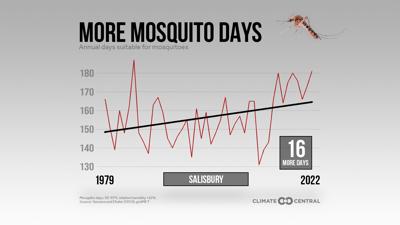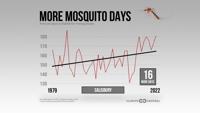SUSSEX COUNTY, Del. - Mosquito season has arrived on Delmarva and it is lasting longer than in prior decades. Since 1980, the number of days suitable for mosquitos has increased by over two weeks due to rising temperatures and higher humidity levels.
That longer mosquito season is playing a role in growing the mosquito population and ultimately increasing the risk of mosquito-borne disease. The most commonly seen mosquito-borne disease in our region is the West Nile virus.
“Mosquito populations build up, the West Nile virus pathogen builds up, and the probability that a human is in the right place on any given day or across a bunch of days is higher if you have more days,” explained Dr. Shannon LaDeau, a senior scientist at the Cary Institute who specializes in disease ecology.
It is not just the West Nile virus. As the climate continues to warm, it is expected that we will see the introduction of other mosquito varieties that are the carriers of dengue, yellow fever, and Zika. The mosquitoes that can carry dengue and Zika already have populations in warmer, urban centers in the Mid-Atlantic and northeast. The mosquitoes which are of greatest concern can spread yellow fever and are currently confined to areas in and around Miami.
There are ways that you can combat the growing mosquito problem in your very own yard. Mosquitoes spend three out of four life stages in water. Mosquitoes require standing water to breed and grow. If you remove still water from your yard, you can help to eliminate a population of mosquitoes that could impact you and your neighbors. Ways to remove standing water include, but are not limited to, adding fountains to bird baths, cleaning out gutters to make sure they can drain properly, and removing bases of flower pots which can retain water.







